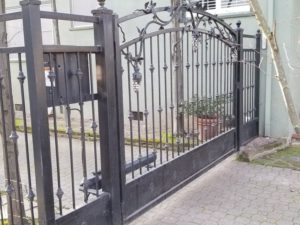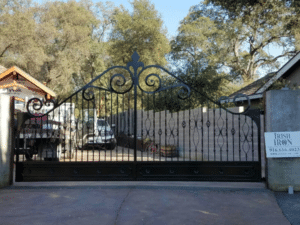Introduction
A driveway gate isn’t just a barrier; it’s the first statement your home makes to visitors and passersby. It’s a blend of a protective embrace and an aesthetic flourish that sets the tone for your abode. The right gate not only fortifies the perimeter of your property, deterring unwanted guests and safeguarding your sanctuary, but it also complements the architecture and landscaping, enhancing curb appeal and potentially increasing property value.
But the journey to selecting the perfect gate is paved with a plethora of choices and considerations. Material and design interplay with the functional aspects such as security features and automation. The size and installation process can be just as crucial as the gate’s style, dictating not just the look but also the ease of use. And, of course, the budget will always have a say in the final decision, weaving together upfront costs with long-term maintenance.
In this guide, we’ll navigate through the essential factors that should influence your choice of a driveway gate. From the traditional charm of wooden designs to the sleek, modern appeal of metal or vinyl, the right materials can define your gate’s character. We’ll delve into the mechanics of swinging versus sliding gates, the convenience of automation, and the critical importance of safety features. Sizing, installation, and local regulations will come under scrutiny, ensuring your choice not only fits your driveway but also complies with any zoning laws. Finally, we’ll consider the financial aspects, including long-term value and maintenance.
Embarking on the path to find your ideal driveway gate can be daunting, but with the right information and a clear understanding of your needs, you can make a choice that is both practical and visually pleasing. Let’s begin this journey by exploring the pivotal factors that will lead you to the driveway gate that best suits your home and lifestyle.
Want an easy-to-follow checklist of this guide? Print one here.

Understanding Your Driveway Gate Needs
When choosing the perfect driveway gate, it’s essential to consider your primary needs. Do you prioritize security, privacy, or convenience? Often, it’s a blend of all three, but understanding where your preferences lie will help you communicate effectively with a professional who can bring your vision to life.
A. Security
Security is a paramount concern for many homeowners. A driveway gate serves as the first line of defense against intruders, and the level of security you need can significantly influence the type of gate you choose.
- Height and Solidity: A tall, solid gate can deter trespassers simply by making access more difficult. Consider gates that are at least 6 feet tall with vertical bars close enough to prevent a person from squeezing through.
- Material Strength: Wrought iron and steel are robust and can offer high security, while wood and vinyl might be more for privacy or aesthetic appeal.
- Locking Mechanism: Look for gates with strong, tamper-resistant locks. Electronic locks can provide an additional level of security, with features like keypads or biometric systems.
- Visibility: Decide if you want a gate that allows you to see out (and others to see in) or if you prefer something that offers no visual access to your property.
Communicate to your gate specialist the level of security you’re seeking. They can suggest features like reinforced frames, electronic access controls, and even integration with your home security system.
B. Privacy
Privacy can be just as crucial as security. The design of your gate can significantly impact how secluded your property feels.
- Solid Panels: If complete privacy is your goal, consider a gate with solid panels that block the view of your driveway and home from the outside.
- Louvered or Slatted Design: For a balance of privacy and airflow, louvered designs can obscure the view while allowing light and air to pass through.
- Frosted or Tinted Glass: If you’re opting for a gate with glass elements, frosted or tinted options can provide privacy without sacrificing style.
Discuss with a professional the level of privacy you desire. They can help you choose a design that matches your home’s exterior while providing the seclusion you need.
C. Convenience
Your gate should not only look good and be secure but also fit into your lifestyle seamlessly. This is where the choice between automatic and manual gates comes into play.
- Automatic Gates: These gates are the pinnacle of convenience, allowing you to open and close the gate with the push of a button from the comfort of your car. They can be equipped with sensors, keypads, or remote controls.
- Manual Gates: A more cost-effective option, manual gates require you to physically open and close them. While they can be less convenient, especially in bad weather, they’re also simpler to maintain and don’t depend on electricity.
When talking to gate installers, express your daily routine and how you envision using the gate. For those with mobility issues or tight schedules, an automatic gate might be non-negotiable. For those who appreciate simplicity and are looking to cut costs, a manual gate could be the ideal choice.
By assessing your needs in terms of security, privacy, and convenience, and communicating them clearly, you’ll be well-equipped to work with a professional to select a driveway gate that meets your needs, fits your lifestyle, and welcomes you home with style and functionality.
Material Matters
Selecting the right material for your driveway gate is not just about matching it to your home’s exterior—it’s about finding the right balance between durability, maintenance, and aesthetic appeal. Let’s explore the options, with a subtle nod to metal gates, which our company specializes in due to their durability and versatile design options.
A. Wood
Pros:
- Classic Aesthetic: Wood offers a timeless look that can be customized to suit any home style.
- Natural Insulation: Wood naturally provides some insulation and soundproofing.
- Customizability: It can be cut and shaped into unique designs.
Cons:
- Maintenance: Requires regular staining or painting to prevent rot, warping, and termite damage.
- Durability: More susceptible to weather damage over time compared to metal.
- Cost: High-quality, durable woods like cedar or mahogany can be expensive.
Questions to Consider:
- Are you prepared for the upkeep required to maintain a wood gate?
- Will the gate be exposed to harsh weather conditions that might affect its longevity?
- How does the cost of premium wood fit into your overall budget for the gate?
B. Metal
As our area of expertise, metal gates offer a blend of strength, security, and style. Here’s why they’re often the material of choice:
Pros:
- Strength and Security: Metals are tough and can provide a high level of security.
- Low Maintenance: Unlike wood, metal gates require less upkeep and are not prone to pests.
- Versatile Designs: Metal can be wrought into intricate patterns or sleek, modern lines.
Cons:
- Rust: Some metals may rust if not properly coated or treated.
- Cost: High-quality metals and custom designs can be more expensive upfront.
- Conductivity: Metal gates can get hot to the touch in direct sunlight.
Questions to Consider:
- How important is security and durability to you?
- Are you looking for a low-maintenance option that will stand the test of time?
- Is the initial investment into a high-quality metal gate justified by the potential long-term benefits?
C. Vinyl
Pros:
- Low Maintenance: Vinyl gates require very little maintenance and are easy to clean.
- Variety of Styles: Available in colors and textures that mimic wood or metal.
- Weather Resistance: Non-susceptible to rust or rot and maintains its appearance over time.
Cons:
- Less Sturdy: Not as strong as metal, can be susceptible to damage in extreme weather.
- Limited Customization: While there are many styles, there’s a limit to how much vinyl can be customized.
- Environmental Impact: Vinyl production and disposal have a higher environmental footprint.
Questions to Consider:
- Do you prioritize ease of maintenance over the potential for customization?
- Is the aesthetic appeal of wood or metal important, and if so, can vinyl satisfactorily mimic it?
- Are you concerned about the environmental impact of your gate material?
D. Composite
Pros:
- Durability: Composites can withstand various weather conditions and resist rot and rust.
- Design Flexibility: They can be made to look like wood or metal and can be fashioned into numerous styles.
- Low Maintenance: They don’t require much upkeep and are not prone to insect damage.
Cons:
- Cost: Often more expensive than simple wood or vinyl options.
- Weight: Can be heavier than wood or vinyl, which may require more robust gate operating systems.
- Limited Repair Options: Damaged composite materials are often harder to repair than wood or metal.
Questions to Consider:
- Are you looking for a material that combines the benefits of both wood and metal?
- Is the longevity of the material a top priority for you?
- How does the higher initial cost compare to the potential savings in maintenance?
When selecting the material for your driveway gate, consider the balance of aesthetics, maintenance, and durability. Metal gates, while they may come with a higher upfront cost, offer enduring strength and timeless elegance with minimal maintenance, making them a preferred choice for homeowners who value security and longevity. Engage with a professional to explore the range of metal options, from the grandeur of wrought iron to the sleekness of aluminum, and find a gate that not only adds curb appeal but also stands as a steadfast guardian to your home.
Design and Aesthetics
The design and aesthetic of your driveway gate is a reflection of your personal style and the character of your home. It’s the fine details and design choices that can make your gate a standout piece or a seamless addition to your property’s overall look.

A. Matching Your Home’s Style
Pros:
- Traditional Designs: These often feature ornate details, such as curves and scrolls that exude elegance and grandeur.
- Compatibility: They blend well with classic architectural styles like Victorian or Colonial.
- Timeless Appeal: Traditional designs rarely go out of style and can enhance the period look of your home.
- Contemporary Designs: Sleek lines and minimalist patterns characterize modern design, offering a clean and updated look.
- Modern Homes: Perfect for mid-century modern, industrial, or contemporary homes.
- Bold Statements: Contemporary designs can act as a statement piece, often becoming a focal point.
Cons:
- Traditional Designs: Can look out-of-place with modern architecture if not chosen carefully.
- Contemporary Designs: May not blend well with the natural landscape or traditional home styles.
Questions to Consider:
- Does your home have a clear architectural style that the gate should match?
- Are you looking for a gate that complements or boldly contrasts with your home’s design?
- How do you envision the design of your gate impacting the overall curb appeal?
B. Customization Options
Pros:
- Personalization: Custom designs can reflect your personal taste and create a unique look.
- Flexibility: Allows you to incorporate elements like family crests, monograms, or custom artwork.
- Fit and Function: Tailored dimensions and designs can fit specific landscape needs or functionality.
Cons:
- Cost: Customization often comes at a premium price compared to standard designs.
- Time: Custom designs may require a longer lead time for fabrication and installation.
Questions to Consider:
- What unique features would you like your gate to have that reflect your personal style or family heritage?
- How much value do you place on having a one-of-a-kind gate?
- Are you prepared for the potential additional cost and time investment required for a custom design?
C. Color Choices
Pros:
- Visual Impact: The right color can make your gate pop or subtly blend it with the surroundings.
- Protective Coatings: Quality paint jobs can serve as an additional layer of protection against rust and weathering.
- Aesthetic Harmony: Coordinating the gate’s color with your home’s trim or landscape can create a harmonious look.
Cons:
- Maintenance: Some colors may show dirt or wear more readily and require more frequent cleaning or touch-ups.
- Trends: Choosing a trendy color can date your property; neutrals tend to have more staying power.
Questions to Consider:
- What colors complement your home’s exterior and landscape?
- Are you looking for a color that stands out or one that blends in?
- How much maintenance are you willing to perform to keep the colors vibrant and the gate looking its best?
When discussing your needs with a gate design specialist, bring photos of your home and any inspirational images you have collected. This will help them understand your vision and guide you towards a design that suits your home’s architectural style. Whether you opt for the classic charm of traditional designs, the sleek allure of contemporary gates, or something entirely custom, the design and color of your gate are where your personal taste takes center stage. Remember, the gate is an extension of your home and should therefore reflect the same care and thought you put into the design of the home itself.
Mechanism and Automation
The choice of mechanism and automation for your driveway gate significantly impacts its convenience, security, and safety. Here, we break down the essentials of swinging versus sliding gates, delve into the world of automation, and underscore the importance of safety features.
Swinging vs. Sliding Gates
Swinging gates are often chosen for their classic appearance and straightforward operation, requiring a clear, flat space to operate properly. They’re well-suited to properties with ample driveway space but can be hindered by snow accumulation or debris, which may block their path.
On the other hand, sliding gates are perfect for driveways with limited space or those on an incline, as they require no room to swing outwards but do need adequate space along the fence line to slide open. While they offer a practical solution for wider entrances and can be more secure due to their robust operating mechanism, installation can be more complex and may come with a higher cost.
Automation Features
The modern homeowner often looks for ease and efficiency in gate operation, making automation features a popular choice:
- Remote controls enable you to open or close your gate from the comfort of your car.
- Sensors add a layer of security by detecting any obstruction, minimizing the risk of damage or injury.
- Timers can be programmed to automatically open or close the gate at specific times for added convenience.
While automation offers unparalleled convenience, it is also accompanied by higher initial costs and potential maintenance considerations. Automated parts, though reliable, may require attention over time.
Safety Features
Safety should never be an afterthought, particularly with automated gates:
- Auto-reverse mechanisms ensure that the gate stops and reverses if it encounters an obstruction.
- Emergency releases are critical in power outages, allowing the gate to be opened manually.
- Warning signals such as lights or alarms alert those nearby when the gate is in operation.
Although these safety features can introduce additional complexity and must comply with local safety codes, they are vital for preventing accidents and ensuring the well-being of your family and visitors.
In conclusion, when planning for your driveway gate, consider the practicality of the gate’s operation, how the features fit into your lifestyle, and the safety of those who will interact with it. A detailed discussion with a gate installation professional can help align these choices with your needs, ensuring that you select a gate that offers the right mix of functionality, convenience, and safety.
Sizing and Installation
Selecting the right size and ensuring proper installation are critical steps in the driveway gate acquisition process. A gate that’s not the right fit or improperly installed can lead to a host of issues, from functional failures to legal complications. Here’s what you need to know to get it right from the start.
A. Measuring for the Perfect Fit
The size of your gate is not only a matter of aesthetics but also functionality. To measure for the perfect fit:
- Width: Measure the driveway’s width at the point where the gate will be installed. Consider any extra width needed for the gate’s opening mechanism, especially if you choose a swinging gate.
- Height: Determine an appropriate height considering visibility, security, and aesthetic balance with your property’s fencing or walls.
- Clearance: Ensure there’s enough space on either side of the gate for it to operate freely, without obstruction from landscaping or other structures.
It’s essential to account for any sloping in your driveway, as this will affect the installation of a swinging gate. For sliding gates, make sure the path of the gate is level and clear of obstructions for the gate’s entire range of motion.
B. Professional vs. DIY Installation
While some may consider installing a gate a DIY project, there are several factors to keep in mind:
- Complexity: Installing a gate, especially an automated one, can be complex and requires a certain level of expertise.
- Tools and Equipment: Professional installations use specialized tools and equipment to ensure the gate is properly aligned and secure.
- Warranty: Many gate manufacturers require professional installation as a condition of their warranty.
Consider professional installation to ensure the job is done right. Professionals can handle the heavy lifting, technical setup, and any unexpected challenges that may arise during the installation process.
C. Zoning and Permits
Before installation, it’s crucial to understand the local zoning laws and permit requirements:
- Local Regulations: Check with your local municipality or county office to find out what’s permitted in terms of gate height, style, and setback from property lines.
- Permits: Many localities require a permit for the installation of a driveway gate, especially if it involves electrical work for automation.
- HOA Rules: If you live in a community with a Homeowners Association (HOA), review any covenants or restrictions that may dictate the design or size of your gate.
Failing to adhere to local zoning laws and permit requirements can lead to fines or being forced to modify or remove the gate entirely.
By taking the time to properly measure your space, opting for professional installation, and understanding the legal requirements, you’ll ensure that your driveway gate is a perfect fit for your property and compliant with all regulations. This attention to detail will pay off in the long run, saving you time, money, and legal headaches, while providing you with a gate that enhances your property’s functionality and curb appeal.
Budget Considerations
When it comes to installing a driveway gate, budgeting is an essential step. Understanding the cost factors, long-term value, and financing options will ensure that you make a sound investment that aligns with your financial plan. Here’s a breakdown of the budget considerations to help you navigate the costs associated with driveway gates.
A. Cost Factors
The price of a driveway gate can vary significantly based on several key factors:
- Material: The type of material greatly influences the cost. Metal gates, especially wrought iron, tend to be more expensive due to their durability and intricate designs, while wood can vary in price depending on the type and treatment. Vinyl and composite materials often offer a middle-ground in terms of pricing.
- Design: A custom design will cost more than a standard, off-the-shelf model. The complexity and uniqueness of the design can add to the price, as can the size of the gate.
- Automation: Adding automation features such as electric motors, sensors, and remote controls will increase the initial cost. The more advanced the automation system, the higher the price tag.
- Installation: Professional installation is an additional cost to consider. Complex installations that require electrical work or custom adjustments can add to the overall expense.
B. Long-Term Value
When considering the cost of a gate, it’s important to look beyond the initial purchase and installation:
- Durability: Investing in a higher-quality gate can lead to reduced maintenance costs and a longer lifespan, providing better value over time. Metal gates, for example, while higher in initial cost, can offer this long-term value.
- Maintenance Costs: Some materials require more maintenance than others. Wood may need regular staining or sealing, while metal may need rust protection. Factor these ongoing costs into your budget.
- Resale Value: A well-chosen gate can enhance curb appeal and potentially increase your property’s resale value. Consider this potential return on investment when selecting your gate.
C. Financing Options
For those who cannot pay the full cost upfront, there are financing options available:
- Payment Plans: Some gate manufacturers or installers offer payment plans that allow you to spread the cost over several months or years.
- Home Improvement Loans: Banks and other financial institutions offer loans specifically for home improvements that can cover the cost of a new gate.
- Home Equity: If you have equity in your home, a home equity line of credit (HELOC) can be a way to finance your gate with the potential for tax-deductible interest.
Financial Tips:
- Get Multiple Quotes: Always get multiple quotes to ensure you’re getting a fair price.
- Prioritize Needs Over Wants: Focus on what you need in a gate rather than what you want to stay within budget.
- Plan for the Unexpected: Set aside a contingency fund of around 10-15% of the project cost to cover any unforeseen expenses.
By carefully considering the cost factors, the potential for long-term value, and the available financing options, you’ll be well-equipped to make an informed decision that balances your desire for a beautiful and functional driveway gate with your budgetary constraints. With thoughtful planning and clear financial parameters, you can invest in a gate that meets your security and aesthetic needs without breaking the bank.
Maintenance and Upkeep
Proper maintenance and upkeep are vital to ensuring your driveway gate remains functional and aesthetically pleasing for years to come. Each material and mechanism type has its own set of maintenance requirements, and being proactive can help you avoid costly repairs down the line.
A. Routine Maintenance
Here are some material-specific maintenance tips:
- Wood: Regularly inspect for signs of rot, insect damage, or warping. Apply a fresh coat of paint or sealant every few years to protect against the elements.
- Metal: Check for rust spots, especially if your gate is made of iron. Use steel wool to remove rust and apply a rust-inhibiting primer and paint. Ensure moving parts are lubricated regularly.
- Vinyl: This low-maintenance material can be kept clean with a simple solution of soap and water. Inspect for any cracks or breaks, especially after extreme weather conditions.
- Composite: Generally requiring less maintenance, just clean with soapy water. Check the hardware periodically to ensure everything is tight and aligned.
For automated gates, it’s crucial to regularly test the gate’s operation, check for any unusual noises, and ensure sensors and remote controls are functioning correctly. Keep the gate’s path clear of debris and consider a professional check-up annually to ensure all electrical components are in good working order.
B. Troubleshooting Common Issues
Should your gate malfunction, here’s how to address common issues:
- Noise: Squeaking or grinding noises often indicate a need for lubrication. Apply a suitable lubricant to hinges and wheels.
- Sticking or Jamming: Remove any obstructions in the gate’s path. For sliding gates, ensure the track is clean and clear of debris.
- Non-Responsive Automation: Check the power supply, fuses, and batteries in the remote control. Reset the system if necessary, or contact a professional if these steps do not resolve the issue.
Keeping a list of common troubleshooting steps and the contact information of your installation professional or manufacturer can expedite the process should issues arise.
C. Longevity Tips
To ensure your gate stands the test of time:
- Regular Inspections: Conduct seasonal inspections and after any major weather events.
- Immediate Repairs: Address any damage or wear immediately to prevent further deterioration.
- Quality Parts: When parts need to be replaced, opt for quality over cost savings to avoid repeated issues.
By adhering to a regular maintenance schedule and addressing issues promptly, you can greatly extend the life of your driveway gate and ensure it continues to serve its purpose effectively. Remember that while routine maintenance can often be handled on your own, don’t hesitate to call in professionals for more complex issues, especially when it comes to the gate’s automation system. A well-maintained gate not only operates efficiently but also contributes positively to the first impression your home makes.
Conclusion
In our journey through the considerations for choosing the perfect driveway gate, we’ve covered the essential factors that ensure you make an informed and satisfying decision. From understanding the importance of matching the gate to your needs in terms of security, privacy, and convenience, to selecting the right materials that balance aesthetic charm with functional durability. We’ve explored the intricacies of design, the advantages of automation, and the necessity of safety features. The size and installation process have been demystified, revealing the importance of professional expertise, and we’ve navigated the complexities of zoning and permits to ensure legal compliance.
We delved into the financial aspects, discussing the immediate costs and the long-term value of different materials and designs, and provided guidance on financing options to help manage the investment. Lastly, we emphasized the importance of maintenance and upkeep, offering practical tips for routine care and troubleshooting common issues to ensure your gate’s longevity.
Choosing a driveway gate is a significant decision that requires a thoughtful balance of practicality and personal taste. As you weigh these factors, consider how each aspect aligns with your unique needs and the specific demands of your property. Remember that this is an investment not just in your home’s security and curb appeal but also in the daily functionality of your property.
If you’re ready to take the next step or still have questions, we invite you to reach out for a professional consultation. Expert advice can tailor these considerations to your personal situation, ensuring that your driveway gate serves you well for many years. We also encourage you to share your experiences and tips in the comments below. Your insights could be invaluable to others making this important decision. Let’s open the gate to a secure, beautiful, and well-suited entrance to your home.
Additional Resources:
- Checklist of this guide here.
- View our gallery of gates for inspiration.
- Contact us today to get a free design consult.



